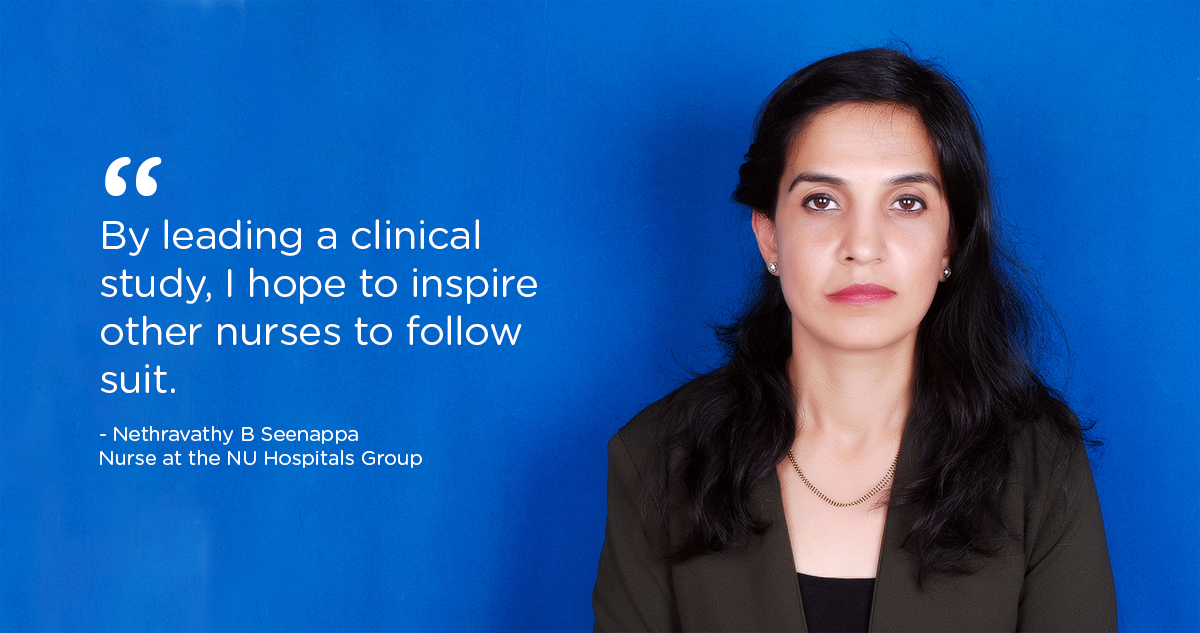Every year, Wellspect HealthCare awards two study grants to nurses whose clinical studies shine a light on medical practices related to bowel and bladder management. The study grants are one of the ways through which Wellspect upkeeps its commitment to advance continence care.
This year’s study grant (2022) was awarded to Nethravathy B Seenappa, from Bangalore, India, (BSC in Nursing, MSC in Urology). In a candid interview with Wellspect, Seenappa explains why she, as a practicing nurse, applied for a study grant.

Nurses are not passive assistants
Nurses in India, where I come from, still need to grow out of a reputation of passive assistants to clinicians. Nurses have a very important role to play in identifying questions related to clinical nursing and in designing studies to test their hypotheses, explains Seenappa. Study grants, like the one of Wellspect, provide us nurses with an opportunity to take more prominent roles in the hospitals and clinics where we work. They enable us to influence our career path too by providing an opportunity to develop subspecialties, she adds.
Nursing subspecialties are still in an infancy stage in India. The NU Hospitals Group - where Seenappa works - is currently developing subspecialty nursing in Nephrology and Urology. Seenappa will direct the subspecialty program and is expected to guide potential studies conducted by the nurses.
“By leading a clinical study myself, I hope to inspire other nurses in our hospital as well as in the subspecialty program, to follow suit”, says Seenappa.
Study integrated into daily work
When asked about the time commitment it takes to pull through a clinical study, Seenappa says that a big part of the work can be integrated into the nurses’ daily work. Nevertheless, nurses must do better, she says, to create and demand time for research and to make it part of a professional growth plan. It is an undertaking that is worth all the rewards it brings, she highlights.
Nurses must do better to create and demand time for research and to make it part of a professional growth plan.
Seenappa believes that in tandem with more nurses prioritizing clinical studies, more study grants targeting nurses specifically will likely emerge. In India specifically, opportunities for nurses are limited and study grants are primarily given to clinicians in academic institutions. But a proactive attitude from nurses can change this status quo.
Health care impediments in low-income countries
Asked to give us a brief about her study, Seenappa highlights that her research explores impediments to compliance with intermittent catheterization (IC) in a low-income country, that go beyond universal impediments such as denial and non-acceptance.
Solutions still to be proposed in Seenappa’s clinical study will inform future IC practices and teachings at the NU Hospitals Group, where Seenappa works. They will hopefully also resonate elsewhere around the world where similar impediments are identified.
In its broader sense, Seenappa’s research is an important reminder of the inequalities that govern our global access to healthcare services and products. It is also a reminder of the importance of collecting clinical evidence that takes into consideration contextual constraints and limitations because compliance rates and treatment outcomes differ per context.
Apply for Wellspect study grants
Asked for her final take-aways, Seenappa says she would like to encourage nurses to take on a more proactive role to research. This will reflect positively on the nursing profession while also advancing patient care and influencing nurses’ career path. It is like hitting three birds in one stone – not two, concludes Seenappa.
You can find more details about Wellspect’s study grants, as well as a listing of previous winners, on Wellspect.com. The application period for the nurse study grant is open until the 01st of July 2023.
To empower nurses to apply for research grants and cover a wide community of nurses, Wellspect work closely together with lead nursing organizations including the European Association of Urology Nurses (EAUN) as well as the International Network of Spinal Cord Injury (SCI) Nurses and The Nursing Special Interest Group (NurSInG).
Beyond providing study grants on topics related to bladder and bowel management, Wellspect also joins forces with nurses, doctors and other care providers to inform future product designs and to generate clinical evidence prior to, as well as post, product developments. By partnering with clinical practitioners, MedTech companies like Wellspect can develop the next generation of bladder and bowel products and make a real difference in the lives of people who depend on such products.




